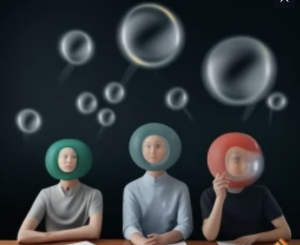Why are we staking our future on artificial intelligence when the downsides of doing so are obvious and profound, and potentially irreversible? We’re at a fork in the road of human history; we can continue following the current path toward greater and deeper technological reliance, and surrendering to the consequences of that choice. Or, we can decide to chart a radically different course.
We can, still, choose to refrain from diving headfirst into this AI experiment on human consciousness. We can decide to not do what we know we can do. As humans who fundamentally want to be happy and don’t want to suffer, we can choose not to be seduced and hypnotized by the excitement, greed, and competitiveness of the tech wizards in Silicon Valley.
As a psychotherapist and interfaith minister, I can say with certainty that technology, in the way we’re using it, has become an obstacle to our overall happiness and well-being. Technology is severely damaging young people’s ability to connect interpersonally and enjoy themselves. The surgeon general has determined that the mental health of young people is “the defining health crisis of our time.” And yet we proceed forward, accelerate faster and harder down the same path, and commit more fiercely to AI as the great solution to life.
Why do we continue hurling ourselves toward what will most certainly become an existential crisis for our society? Why are we surrendering our autonomy and agreeing to be ruled by a technological wizard who doesn’t understand or care about us humans enjoying good lives—a wizard much like Hal the computer, which Stanley Kubrick imagined in his prophetic 1968 film “2001: A Space Odyssey.”
We continue in the name of what we call “progress,” which we define as that which creates more efficiency, is more productive, cuts costs, and ultimately, generates profits. So too, “progress” is whatever allows us to do less, removes some life tasks, and promises to make things easier and faster. The end goal, or so it seems, is to become passengers in our own lives, even if it’s a virtual Frankenstein who’s driving the bus.
The problem, however, is that our definition of “progress” and obsession with pursuing it benefits only a small number of people, those who also reap enormous financial rewards and power from this system.
What if happiness and well-being were what we pursued, considered “progress,” and designed our society around? What if our goal as a society were to create a good life for its members, a life we enjoy and want to inhabit? What if we focused on our experience of living rather than on an idea of “progress” that makes so many people not want to live? Can we change at this stage of the evolutionary game — redefine “progress” such that it means learning to be okay where we are, not always have to move forward at epic speed, and refrain from chasing every possibility regardless of whether it’s good for us or that we even want?
Despite everything we know and directly experience with technology, how it affects and harms our children, and despite our society’s multigenerational epidemic of anxiety, loneliness, and depression, nonetheless, we keep pushing forward, doubling down on technology—going after whatever we can think up, simply because we can think it. We do this no matter the cost, offering up our lives and ourselves as kindling in the bonfire we call “progress.”
We cannot give up on well-being and happiness as the goals for our society, and cannot surrender control of our lives to an AI wizard just because it tells us we should, and will be good for us. What more do we need to know, or discover, to be able to step off this train of relentless “progress,” to take our foot off the accelerator and reevaluate what we want, what matters to us as humans, and how we want to design (and live) our lives?


